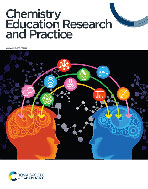Physical chemistry students’ learning profiles and their relation to study-related burnout and perceptions of peer and self-assessment
Abstract
We explored chemical engineering students’ approaches to learning, study-related burnout, and perceptions of peer and self-assessment in a challenging physical chemistry thermodynamics course. Cluster analysis revealed three learning profiles based on students’ approaches to learning: students who scored high in both organised studying and the deep approach to learning, students who scored high in the unreflective approach to learning, and students who scored high in all three approaches. According to our findings, students who employed deep learning strategies and managed their time carefully experience the least study-related burnout. These students also felt more efficacious when participating in assessment and had fever negative experiences of both peer and self-assessment. Consequently, physical chemistry educators should adopt practices that facilitate a deeper approach to learning, including paying careful attention to course workload and utilising teaching methodologies that can foster the deep approach like peer and self-assessment.


 Please wait while we load your content...
Please wait while we load your content...